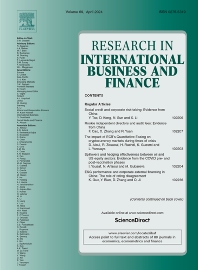Micron
- ISSN: 0968-4328
- 5 Year impact factor: 2.2
- Impact factor: 2.5

Our Economics and Finance titles are essential reading for students, scholars, policymakers, and market practitioners who want to stay up-to-date with the latest research and foundational topics in the field, from financial markets and trade to e-commerce, econometrics, quantiative investing, financial technology, financial engineering, global finance, corporate finance, law and economics, macro and microeconomics, and risk management.
Titles manage to balance quality of content with the increasing demand for a wider view of the vast array of topics in the field of Economics and Finance.










Agricultural and natural resource economics
Business economics
Economic development technological change and growth
Economic history
Economic systems
Financial economics
General economics and teaching
Health education and welfare
Industrial organization
International economics
Labor and demographic economics
Law and economics
Macroeconomic and monetary economics
Mathematical and quantitative methods
Methodology and history of economic thought
Microeconomics
Public economics
Urban rural and regional economics